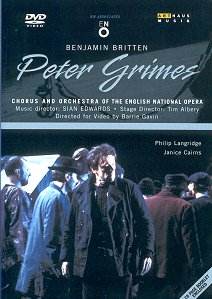This is a specially filmed version of the English
National Opera stage production from a decade ago, now re-launched
in DVD format. The result is one of the most successful, all-round
opera filmings I have ever seen.
The camera work is managed imaginatively without
pretension which is in keeping with a production that strikes
a balance between realism and simple symbolism. The latter quality
prevails in the images that are shown during the musical interludes.
These convey the enigmatic power of nature and the sea that in
turn reflect the ambiguities of human nature in the story. The
camera enhances the tension between the public and the private
that is so skilfully directed in the stage production.
But no dish can be perfect without quality ingredients
and here we have a cast as good as you can get for this opera.
The most important ingredient is, of course, the portrayal of
the anti-hero himself.
For years I had a bit of a problem with Grimes,
finding that I could never fully tune into the opera in spite
of being surrounded by people, such as my music master at school,
who were besotted with Britten generally and Grimes in
particular. It was only when I saw a performance on TV with Jon
Vickers as Grimes that the obvious truth dawned. The problem (or
at least my problem) was Peter Pears, the man for whom Britten
created the role, and the Pears clones that followed. In watching
Pears I could never get away from the prejudice that here was
a stereotypically effete, emotionally repressed Englishman thinly
disguised in a fisherman's sweater. With the macho Vickers the
sweater looked as if it belonged. Emotion was so unfettered that
audiences could be left, in the words of distinguished writer
and critic Davis Cairns, "utterly drained". There is much of the
wounded animal at bay in Peter Grimes, someone who needs to fight
back but is not sure how. Vickers attempts at fighting back were
highly assertive. Britten, famously, did not like the portrayal
at all.
I am not alone in this. Peter Conrad in his book
on opera, A Song of Life and Death says of Pears that the
"fragile, white, androgynous voice didn't belong in a homespun
jersey and sou'wester". Of Vickers: "He invested the character
with a virile strength of will which alarmed the composer."
In this DVD version, not only is Philip Langridge's
interpretation of the role just right in my opinion, being a convincing
compromise between the two extremes above, but he has the acting
power to be able to convey it, not to mention a commanding voice
well experienced in handling Britten's melodic lines and subtle
word setting. Right from the opening court scene we can observe
how he can act with his face, thus allowing the camera to intrusive
close-up without the embarrassing result that is often the case
in filmed opera. Even without singing he conveys incredulity at
his situation, a pained bewilderment that carries with it a sense
of gross injustice. So he catches our sympathy from the start,
something that is likely to stay through the opera in spite of
the less attractive sides to the character that are later revealed.
Langridge’s performance must be among the most
compelling operatic portrayals available on film, enormously aided
by immaculate playing from the rest of the cast. Janice Cairns
plays Ellen Orford as a person of solid integrity and we can see
how Grimes would be attracted to the protective side of the character.
When she faces the crowd alone the scene is imaginatively filmed
in birds eye view from above. With her school books tucked under
her arm she has the air of a courageous evangelist. Alan Opie,
an experienced Balstrode, shares with us the pain of the conscience
that pricks him.
The production skilfully manages the crowd scenes,
striking a balance between vigorous representation of a community
at work and play, and a threatening, collective force. This is
done by contrasting bustling stage business with scenes where
the people become a tableau-esque Greek chorus. David Atherton
conducts with a musical energy that adds edge to the drama and
the recorded sound is good.
When English National Opera mount a production
of the nation’s greatest operatic monument, it must surely put
the company under a lot of pressure. It ought to be what it does
best and in this case it certainly does not fail. The filmed version
does it real justice.
John Leeman
